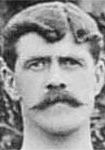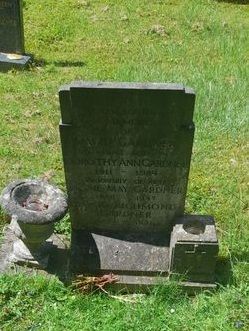David Gardner

Dave Gardner was a Gorbals-boy, who, unlike the families of many others who found their way out to other parts of the city, notably the Southern Suburbs, spent the whole of his childhood and teenage years within the Southside and then left for good. And football was the means by which he did it.
He was born the middle of eleven children, his father a Commercial Traveller, his parents both from Airdrie. He himself became a joiner to trade, who, as a powerful full-back, began his football with Cathcart before in 1893 at twenty stepping up to Third Lanark just as the game in Scotland became professional.
His stay at Cathkin Park would be six years, in the reserves for two, becoming captain, as he would at every club he appeared for. And in 1897 he would be awarded a first cap against Wales, a 2-2 draw at Wrexham both with neither of the goals seemingly due to his error. In fact, whilst it was to be his only international start, he having some competition, notably from Dan Doyle and John Drummond, it was, thus, hardly surprising that at twenty-six Newcastle United, reinforcing after promotion to the English First Division, came in for him and he was on his way.
In the three seasons Gardner spent at St. James's Park Newcastle was to finish fifth, sixth and third but by 1902 he was approaching thirty and Jack Carr was playing more than two games to his every one. It prompted a sideways move as Dave joined Grimsby, for two seasons, the first of which resulted in relegation, and then dropped down to the Southern League and West Ham for three more without any noticeable on-field effect beyond mid-table safety.
Off-field, however, it was a different matter. As he left the Boleyn he married in West Ham. His bride was Jessie Atkinson, herself a Grimsby-girl with whom he would have two children, possibly three. She already had a son, who had been born in 1902. And they would settle in South London, as he had made another sideways-ish move with some success to Croydon Common as it became a professional club and itself joined the Southern League's Second Division. The team won promotion to the First Division in 1909 only to be immediately relegated.
It is said that Gardner continued to play at Croydon until 1912 but he was also training and at thirty-eight his on-field time must have been limited. In any case his time at the club came to an end with the start of The Great War, after which an opportunity opened up that he could not have in any way foreseen, required him to relocate but allowed him as a coach to move up several levels.

The War years would see for financial reasons the demise of Leicester's then club, Fosse, its replacement with City and the arrival of Leith-born Peter Hodge at the helm. And it would be Hodge, who in 1919 brought in Gardner as trainer, seeing improvement, which in 1925 would result in promotion to the First Division. And, whilst Hodge moved on but Dave remained, progress continued. In 1929 City took runners-up spot before something of a fall-off that after 1932 became a tumble. However by then David Gardner was dead. In 1931 he collapsed on a Loughborough golf-course on a club day out, aged just fifty-eight to be buried at Leicester's Gilroes Cemetery, where he would be joined by Jessie in 1947, she aged sixty-one, and eventually by his daughter.
Birth Locator:
1873 - 269, Caledonia Rd., The Gorbals, Glasgow
Residence Locations:
1881 - 448, Crown St. The Gorbals, Glasgow
1891 - 234, Cathcart Road, The Gorbals, Glasgow
1901 - Newcastle
1911-15 - 7, Milton Avenue, Croydon, London
1921 - N/A
1931 - 53, Melrose St., Leicester
Death Locator:
1931 - Longcliffe Golf Course, Loughborough, Leicestershire
Grave Locator:
Gilroes Cemetery and Crematorium, Leicester
Back to the Glasgow Southside Trail
or the SFHG Home page